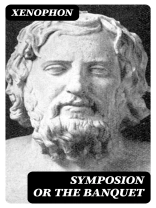Xenophon’s ’Symposion, ’ commonly translated as ’The Banquet, ’ is a rich philosophical dialogue set within the confines of a convivial gathering, showcasing the social and intellectual dynamics of classical Athenian society. Written with a distinctive blend of elegance and accessibility, the text captures the nuanced interplay of friendship, virtue, and the pursuit of wisdom through a series of speeches by renowned figures of the time, including Socrates. The stylistic elements reflect both the humor and seriousness of the discussions, offering a vivid portrayal of aristocratic life while simultaneously engaging with profound ethical inquiries, a hallmark of Socratic thought. Xenophon, a student of Socrates and a significant figure in his own right, provides a unique historical perspective shaped by his experiences as a soldier, historian, and philosopher. His writings often reflect a practical wisdom, steeped in the Socratic method of inquiry. This dual identity, as both an observer and participant in the shifts of Greek intellectual thought, informs his approach in ’Symposion, ’ where he examines themes of identity, community, and the essence of a good life amidst societal challenges. Recommended for readers interested in the intersections of philosophy and social discourse, ’Symposion’ serves not only as a window into ancient Greek culture but as a timeless exploration of the human condition. Its dialogue format encourages reflection on contemporary issues of ethics and relationship, making it indispensable for students of philosophy, history, and literature.
Om författaren
Xenophon (circa 430-354 BCE) was an ancient Greek philosopher, historian, soldier, mercenary, and a disciple of Socrates. Born in Athens, his body of work is a rich source of information on the history and culture of classical Athens. Xenophon was known for his direct and simple style, which was quite different from the often elaborate and poetic narratives of his contemporaries, making his work valuable for its clear historical accounts. His literary contributions include a wide range of subjects, including history, Socratic dialogues, and technical treatises. ’Symposion’ or ’The Banquet’ is one of Xenophon’s notable Socratic works, providing insight into the intellectual atmosphere of Athens and the life and personality of Socrates. Unlike Plato’s account of a similar banquet, Xenophon’s narrative is livelier and less formal, reflecting the mores and entertainment of a symposium among friends. Xenophon’s other well-known works include ’Anabasis’, a recounting of his experience as a mercenary and leader of the Ten Thousand, and ’Cyropaedia’, a fictional account of Cyrus the Great’s education that serves as a study in leadership and governance. His works not only preserve the legacy of Socrates but also provide a valuable primary source for understanding the socio-political world of ancient Greece.












